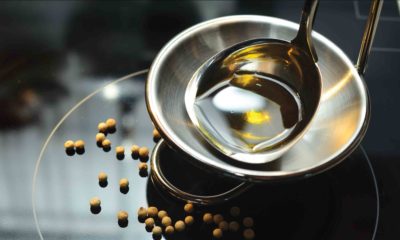
Politics
These Cannabis Products Are Now Outlawed With California’s New Rules
When California’s recreational market comes online on Jan. 1, the industry will have to adjust and follow these rules for cannabis products – or face the state’s new Bureau of Cannabis Control.
California’s massive marijuana industry is a multibillion-dollar game, and as of last Thursday, it is, at last, a game with some rules.
With less than six weeks to go before the advent of the recreational marijuana era, the multiple state agencies responsible for regulating legal cannabis sales, at last, released a set of emergency regulations.
These rules aren’t final, but this is what will take effect on Jan. 1, the first day of legal recreational sales. An important (and slightly confusing!) note: There is a six-month transition period from Jan. 1 to July 1, when some of the rules are relaxed, but only in certain circumstances.
This is a good thing for the products on some dispensary shelves and delivery-service menus — which will become forbidden goods after that time. Other popular items do not enjoy any such grace period and become contraband after Dec. 31.
Here’s a brief rundown of soon-to-be-verboten illegal brands and services.
No edibles stronger than 100 milligrams, no edible serving size bigger than 10 milligrams
The biggest changes are to edibles, and one of the most significant limits is on serving sizes. Will we have to say goodbye to Slactavis’s 1500 mg bottles of syrup, 1000 mg bags of Bomb Chips, Kiva’s 180 mg chocolate bars, and Korova’s 300 mg popcorn bags? Quite possibly, yes.
According to the Bureau of Cannabis Control: “Beginning January 1, 2018, licensees shall not transport or sell any edible cannabis product that exceeds 10 milligrams per serving. Adult-use products may not exceed 100 milligrams per package; however, medicinal cannabis products may exceed 100 milligrams per package.”
Seems pretty clear-cut. At the same time, in the same breath, the bureau says it will allow retailers to “sell cannabis products that do not meet the THC limits per package established by the state Department of Public Health” during the six-month transition period.
Whether the edible dose limits drop on Jan. 1 or July 1, THC limits are a significant disruption to most dispensaries’ edibles menus, which are full of products much, much stronger than 100 mg. It appears that as long as products above 100 mg are sold on the medical cannabis market, and as long as they’re somehow clearly identified as products with many multiple serving sizes, they may be allowed. Don’t throw away your medical marijuana recommendation anytime soon — but it gets worse.
No cartoons, no gummy worms or bears, no medicated lollipops
No more edibles “in the shape of a human being, either realistic or caricature, animal, insect, or fruit.” Sounds like you can have corn-syrup based “gummies,” but they have to be in some kind of generic shape. Still, abandon your sweet tooth, because there’s no cannabis “candy” at all. You can’t even use the word. As per Section 40410, an edible label “shall not contain any of the following: (1) Cartoons; (2) Any likeness to images, characters, or phrases that are popularly used to advertise to children; (3) Any imitation of candy packaging or labeling; or (4) The terms ‘candy’ or ‘candies.'”
Maybe no cannabis cookies or chocolate bars at all?
Also banned under the new regulations are: “Any cannabis product that the Department determines is easily confused with commercially available foods without cannabis.” That would seem to include cookies, brownies, chips, popcorn, macaroons — you name it. Is your favorite brand for sure banned? This would be up to the state’s Department of Public Health to determine on a case-by-case basis.
No added caffeine
Naturally occurring caffeine in coffee beans and tea leaves can be mixed with marijuana to make a potent and pleasant brew like Somatik’s medicated cold-brew coffees. These and similar products, like Satori’s chocolate-covered coffee beans, will remain legal. Anything with added caffeine, however, is not allowed. Somewhere, someone just ripped up their business plan for the “Four Loko of marijuana.”
No THC-infused wine, no CBD-infused “canna-cocktails”
Alcohol and cannabis may be trusted party partners for millions of Americans, but in California’s new legal industry, they shall not mix — at least not in the same glass. “These regulations prohibit alcoholic beverages from being sold as cannabis products,” the California Department of Public Health clarified to Cannabis Now. “This does not prohibit tinctures, but does prohibit THC- or CBD-infused alcohol.”
Whether or not bars or cafes can press on with cocktails enhanced with a dash of CBD or a blast of cannabis-derived terpenes would be a matter for the Department of Alcoholic Beverage Control (ABC) to address and enforce.
No cannabis-infused ice cream or juice bars, no cannabis milk and nothing that needs to be refrigerated
One section of the new regulations outlaws “any cannabis product that must be held at or below 41 degrees Fahrenheit to keep it safe for human consumption, including, but not limited to, cream or custard-filled pies; pies or pastries which consist in whole or in part of milk or milk products, eggs, or synthetic fillings; or meat-filled pies or pastries.” This would seem to include milk, ice cream and a host of perishable goods. You can, however, manufacture and sell cannabis juice.
No massive jars of topicals, and no big containers of Rick Simpson oil
If you were planning on selling a family-sized portion of shatter, sorry. Section 40306 of the new regulations puts THC limits on a “cannabis product that is not an edible product” to no more than 1,000 milligrams of THC for an adult-use product, and no more than 2,000 milligrams of THC for a medical cannabis product. Since most concentrates are sold in servings of no more than a gram, this isn’t a problem for dabbers, but this would seem to limit serving sizes of cannabis oil.
No mainstream advertising
Unless alt-weeklies and websites can prove their audiences are mostly adults, they won’t be able to carry cannabis ads. As per the new Section 5040(a) of the California Code of Regulations: “Any advertising or marketing placed in broadcast, cable, radio, print, and digital communications shall only be displayed where at least 71.6 percent of the audience is reasonably expected to be 21 years of age or older, as determined by reliable up-to-date audience composition data.”
No cannabis products delivered by bicycle, and no shipping products by air or rail
All deliveries need to be in an “enclosed motor vehicle,” and all transportation from producer or manufacturer to retailer must be done in a vehicle or trailer. As reasonable as it may sound to fly, say, concentrates from Humboldt County to Los Angeles, it has to be done via the roads.
No free dab bar, free pre-roll, or brand promotion
Save those big cones full of trim you got for free — they’re now collector’s items. According to 5411(a), “A retailer shall not provide free cannabis goods to any person. A retailer shall not allow individuals that are not employed by the retailer to provide free cannabis goods to any person on the licensed premises.”
But there is an exception! And it’s for medical marijuana patients only, who can receive “free cannabis goods” from a licensed retailer, delivery service, or microbusiness only.
No farm-to-pipe direct pipeline. No “cannabis farmers’ markets”
Not unless the farmer had his or her product tested and packaged for sale, apparently, which would seem to defeat the purpose of the low-key cannabis-friendly farmer’s markets seen on the North Coast. Section 5602(f): “All cannabis goods at a cannabis event shall comply with all requirements for laboratory testing and labeling within this division.”
No bar at the Emerald Cup, or any other cup
You can have cannabis events, but you can’t enjoy a glass of Lagunitas while you attend one. According to Section 5602(d): “Consumption of alcohol or tobacco shall not be allowed on the cannabis event premises.”
TELL US, do you support these new rules for cannabis products?





















